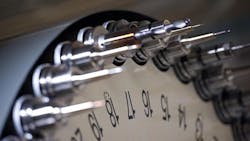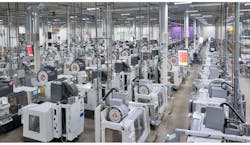Q&A: Proto Labs’ Rob Bodor Talks Additive Manufacturing
This file type includes high resolution graphics and schematics when applicable.
Turning an idea into a product is more than just hacking some hardware and software together. It’s easier to develop a prototype with 3D printers, but many other techniques and methodologies are more appropriate for some applications. Likewise, turning from a prototype to production can be a challenge.
Along those lines, Proto Labs offers a range of production and design services, and maintains extensive production facilities (see the figure) to deliver any number of parts for a given design. I spoke with Rob Bodor about some of Proto Labs' services and what they bring to the table.
Wong: How did Proto Labs get started, and what kind of services does it offer today?
Bodor: Proto Labs was founded as the ProtoMold Company by Larry Lukis in 1999, a self-professed computer geek and entrepreneur. Previously, Larry was the founder of a successful company that sought to design a better printer. He was frustrated by the time, cost, and manual labor involved in getting injection-molded parts, so he decided to develop software that automated the injection molding processes he needed to create his prototypes.
Since then, Proto Labs has applied its proprietary automation technology to an ever-increasing range of both subtractive and additive manufacturing services to help design engineers and developers bring products to market faster. Its quick-turn manufacturing processes include plastic, metal, and liquid silicone rubber (LSR) injection molding; CNC machining and turning; and three additive processes that include stereolithography (SL), selective laser sintering (SLS), and direct metal laser sintering (DMLS). Proto Labs became a public company (NYSE: PRLB) in 2012, and today works with Fortune 500 brands (Northrop Grumman, Ford, Xerox) and garage entrepreneurs alike.
Wong: How does Proto Labs view the current market, and what opportunity has it identified?
âBodor: As product lifecycles shorten, America’s leading brands and the agile startups that challenge them share a need to be able to develop innovative products without being slowed down by manufacturing constraints. Proto Labs' automated solutions make that possible—we aim to meet the need to create a single concept model as easily as a low- to mid-volume production run.
Wong: From a technical perspective, what differentiates you from your competition?
Bodor: Many of our competitors say they offer “on-demand manufacturing,” but don’t offer the level of true interactivity or automation that we offer. Our automated quoting system, which includes free design-for-manufacturing analysis, makes it possible for product designers to see structural weaknesses and flaws in their designs and suggested improvements before ordering parts. In that sense, we try to help our customers design better parts before they even reach the manufacturing stage. When those customers are ready to hit the order button, that same software makes it possible for us to produce and deliver their parts in as little as one day.
We're continually making improvements to our proprietary software to ensure it keeps pace with our growing number of customers and their need for speed and quality. Additionally, our technology enables us to produce parts and prototypes in exactly the amounts our customers need, helping them eliminate waste and protect margins in their product development departments. As a result, we're beginning to consider ourselves as less of a manufacturing vendor, and more of a digital technology company that happens to be involved in the manufacturing industry.
Wong: What kinds of individuals and organizations does Proto Labs work with?
Bodor: We work with some of America's largest brands down to exciting startup companies paving the way with brilliant new product ideas. We're particularly passionate about the next generation of American entrepreneurs, and look to support them through our Cool Idea! Award program. It provides an aggregate of up to $250,000 yearly in manufacturing services to entrepreneurs with great ideas who need the means to get their products to market. Many of our Cool Idea! Award winners have gone on to find significant success, and we're proud to continue to be a part of their ongoing stories.
Wong: Can you tell us in particular about your support for additive-manufacturing technologies?
Bodor: In April 2014, we acquired FineLine Prototyping Inc., which offered stereolithography, selective laser sintering, and direct metal laser sintering, which are three additive-manufacturing technologies that extended our existing suite of molding and machining processes. Additive manufacturing, also known as 3D printing, often times fits in the early stage of the product development process, and is capable of creating finely detailed prototypes in small volumes. But with a process like DMLS, which builds fully dense metal parts, additive is also being increasingly used for low quantities of end-use production parts. We understand the important role that additive technologies play in the manufacturing industry and product development, and will continue to invest in expanding our capabilities on this front.
For more information about Proto Labs, check out the company's blog.
This file type includes high resolution graphics and schematics when applicable.
About the Author
Rob Bodor
Chief Technology Officer
Robert Bodor has served as Proto Labs’ Chief Technology Officer since July 2013, and served as Director of Business Development from December 2012 to June 2013. Prior to joining Proto Labs, he held several roles at Honeywell, most recently leading SaaS business offerings for Honeywell’s Life Safety Division. He also spent four years with McKinsey & Company, advising Fortune 500 companies in the high technology, industrial, and medical sectors, and has been on the executive team of two early-stage companies in the Twin Cities. Robert holds BS, MS, and PhD degrees in engineering and computer science from the University of Minnesota.
William G. Wong
Senior Content Director - Electronic Design and Microwaves & RF
I am Editor of Electronic Design focusing on embedded, software, and systems. As Senior Content Director, I also manage Microwaves & RF and I work with a great team of editors to provide engineers, programmers, developers and technical managers with interesting and useful articles and videos on a regular basis. Check out our free newsletters to see the latest content.
You can send press releases for new products for possible coverage on the website. I am also interested in receiving contributed articles for publishing on our website. Use our template and send to me along with a signed release form.
Check out my blog, AltEmbedded on Electronic Design, as well as his latest articles on this site that are listed below.
You can visit my social media via these links:
- AltEmbedded on Electronic Design
- Bill Wong on Facebook
- @AltEmbedded on Twitter
- Bill Wong on LinkedIn
I earned a Bachelor of Electrical Engineering at the Georgia Institute of Technology and a Masters in Computer Science from Rutgers University. I still do a bit of programming using everything from C and C++ to Rust and Ada/SPARK. I do a bit of PHP programming for Drupal websites. I have posted a few Drupal modules.
I still get a hand on software and electronic hardware. Some of this can be found on our Kit Close-Up video series. You can also see me on many of our TechXchange Talk videos. I am interested in a range of projects from robotics to artificial intelligence.




